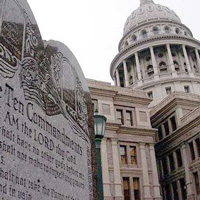What is the role of religion in American public life, and how should religious people understand religious liberty? From the beginning, religious faith and religious communities have played a significant and much-disputed role in shaping the American character and the American republic. The First Amendment to the United States Constitution explains that “Congress shall make no law respecting the establishment of religion, or prohibiting the free exercise thereof.” But the meaning and application of this idea has changed considerably since the founding, and we may be living through yet another revolution in the relationship between religion and democracy in America.
Led by Rabbi Meir Soloveichik of Yeshiva University and former federal judge Michael McConnell of Stanford Law School, this institute will explore the historical background, philosophical foundations, and current controversies about the idea of religious freedom in America. It will begin by asking certain fundamental questions: Is democracy good for religion? Does it allow religious life, in a variety of forms, to flourish? Or does the free marketplace of ideas, especially in the modern age, tend to weaken our religious commitments and communities? Can democracy survive and flourish without the support of religiously-grounded morality? Should religious views of the human good have a serious place in shaping public policy and national culture?
With these fundamental issues refined and enlarged, the institute will then focus on some key political and legal disputes at the crossroads of democratic politics and religious freedom: debates about marriage law, public support for religious schools, decisions related to healthcare and insurance, the adoption of children. In exploring these issues, we will be joined by a range of experts and advocates who are engaged in these disputes, and we will try to formulate the range of alternative perspectives and policy options that lie before us.
We will also pay special attention to the meaning of religious freedom for modern Jews and Judaism, and more broadly how minority religious communities should think and act in the modern American age.
Time and Location
This institute will take place at the Tikvah Center in the heart of New York City (165 E. 56th Street). This is a full time commitment for Monday – Friday, with required sessions in the morning, afternoon, and some evenings.

